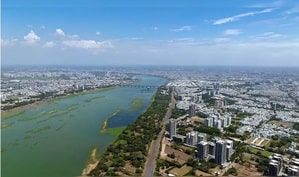Surat has emerged as the leading city in India for air quality improvements, followed by Jabalpur (Madhya Pradesh) and Agra (Uttar Pradesh).
These three cities with population of more than one million, have topped the Swachh Vayu Survekshan (clean air survey) Awards for clean air, the government announced on Saturday.
Union Environment Minister Bhupender Yadav and Rajasthan Chief Minister Bhajan Lal Sharma presented the awards to the best-performing cities where the National Clean Air Programme (NCAP) is being implemented.
In the category for population between 300,000 and 1 million, Firozabad (Uttar Pradesh), Amravati (Maharashtra) and Jhansi (Uttar Pradesh) were recognised as the top three and for cities with fewer than 300,000 people, the toppers were Raebareli (Uttar Pradesh), Nalgonda (Telangana) and Nalagarh (Himachal Pradesh).
Municipal commissioners of winning cities were awarded cash prizes, trophies and certificates.
The Ministry of Environment, Forest and Climate Change (MoEFCC) reported that 51 cities have shown a reduction in PM10 levels by more than 20 per cent compared to the base year 2017-18, with 21 of these cities achieving a reduction of over 40 per cent.
According to the NCAP assessment document, sectors given weightage include biomass and municipal solid waste burning, road dust, dust from construction and demolition waste, vehicular emissions and industrial emissions, among others.
Experts have previously noted that NCAP does not focus on combustion sources and may not be effectively curbing toxic emissions.
A Centre for Science and Environment (CSE) assessment released in July found that road dust mitigation has been the primary focus of NCAP, which was launched in 2019 as the first effort to set clean air targets for 131 polluted cities and reduce particulate pollution nationally.
The assessment revealed that 64 per cent of the total funds (Rs 10,566 crore) has been allocated to road paving, widening, pothole repair, water sprinkling and mechanical sweepers. Only 14.51 per cent of funding has been used for controlling biomass burning, 12.63 per cent for reducing vehicular pollution and a mere 0.61 per cent for controlling industrial pollution.
"The primary focus of the funding is thus road dust mitigation," the assessment said.
NCAP aims to reduce particulate pollution by up to 40 per cent by 2025-26 from the base year of 2019-20. It is India's first performance-linked funding programme to improve air quality.
Originally, NCAP was planned to tackle both PM10 and PM2.5 concentrations in the 131 non-attainment cities. In practice, only PM10 concentration has been considered for performance assessment. PM2.5, the more harmful fraction largely emitted from combustion sources, has been neglected, according to CSE findings.


Tripura Govt contemplating to boost tourism: Minister Sushanta Chowdhury
The state transport and tourism minister Sushanta Chowdhury on Thursday said that the government is contemplating to make tourism as an alternate means of livelihood in the state. Adequate fund has been allocated for further developing the tourism sector, he added.
Imports from B’desh to Tripura increase, exports largely decline: Minister
Imports from Bangladesh into Tripura increased but exports from the northeastern state of India to the neighbouring country substantially declined, state Industries and Commerce Minister Santana Chakma told the Assembly on Thursday.
67 percent households in AMC areas connected with drinking water supply: CM Dr Manik Saha
Chief Minister Dr Manik Saha on Thursday claimed that at least 67% households were connected with drinking water supply in the areas of Agartala Municipal Corporation.
Boy drowns in Muhuri River during Baruni bathing ritual
In a tragic incident, Sayan Pal (18), a 12th-standard student from Arya Colony, Belonia, drowned in the Muhuri River while participating in the holy Baruni bathing ritual on Wednesday afternoon.
Innovative projects launched to supply drinking water from Dumbur: CM
Chief Minister Prof. Dr. Manik Saha today said that several innovative projects have been set up based on the reserved water of the Dumbur water reservoir, making it possible to provide drinking water connections to many families through pipelines.
Govt undertaken measures to increase Howrah river’s navigability: Tripura CM
Chief Minister Prof. Dr. Manik Saha today said that the state government has undertaken a series of measures to permanently address flooding in Agartala city by increasing the navigability of the Howrah River.
Tripura Assembly witnesses spat over minister's 'racist' remark against LoP
The Tripura Assembly witnessed a noisy scene for the fourth day on Thursday over Parliamentary Affairs Minister Ratan Lal Nath's alleged racist remarks against Leader of the Opposition (LoP) Jitendra Chaudhury.
Centre Releases Rs 240.5 Crore to Tripura for Urban Planning Reforms
Chief Minister Prof. Dr. Manik Saha today announced that the Ministry of Finance has released Rs 240.5 crores to Tripura for achieving urban planning reforms.